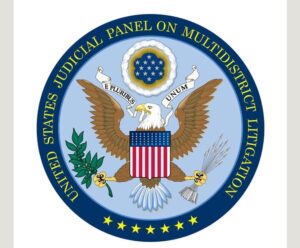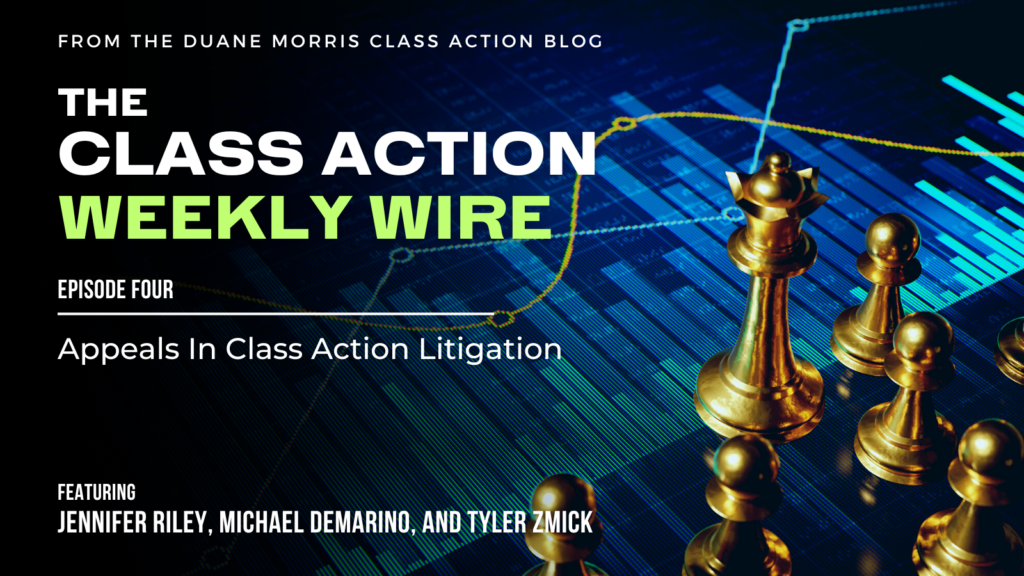 By Gerald L. Maatman, Jr. and Jennifer A. Riley
By Gerald L. Maatman, Jr. and Jennifer A. Riley
Duane Morris Takeaway: During 2022, courts continued to grapple with the rules that govern the certification of classes that contain uninjured class members. Various cases climbed to the federal circuit level, with varying results, and the U.S. Supreme Court once again declined to take up the issue, making uninjured class members a continued topic of disagreement and debate for 2023.
By definition, individuals who did not suffer injury as the result of the defendant’s conduct cannot maintain claims, and courts do not have the power to award them relief. As the U.S. Supreme Court reiterated in its seminal 2020 decision in TransUnion, “Article III does not give federal courts the power to order relief to any uninjured plaintiff, class action or not.” TransUnion LLC v. Ramirez, et al., 141 S.Ct. 2190, 2208 (quoting Tyson Foods v. Bouaphakeo, et al., 577 U.S. 442, 466 (2016) (Roberts, C.J., concurring)). In this respect, the “plaintiffs must maintain their personal interest in the dispute at all stages of the litigation . . . And standing is not dispensed in gross; rather, plaintiffs must demonstrate standing for each claim that they press and for each form of relief that they seek.” Id.
Courts, however, continue to grapple with the application of these concepts in the class certification context and, in particular, they disagree over whether to certify a class, a plaintiff must demonstrate that every putative class member has standing or, stated differently, must demonstrate that the class excludes those individuals who did not suffer harm. In TransUnion, the Supreme Court expressly left open the question of “whether every class member must demonstrate standing before a court certifies a class.” Id. at n.4. Such a requirement has significant consequences for the class action landscape and, as a result, multiple federal circuits considered the issue over the past year.
In Drazen, et al. v. Pinto, 41 F.4th 1354 (11th Cir. 2022), for example, the Eleventh Circuit vacated and remanded an order approving a class settlement after finding that some settlement class members did not experience an Article III injury. The plaintiffs filed suit alleging that the defendant violated the Telephone Consumer Protection Act by sending unwanted calls and text messages. Although the Eleventh Circuit previously held that a single unauthorized text message is not sufficient for an Article III injury, the district court approved the settlement on the basis that “only the named plaintiffs must have standing.” Id. at 1357. Although only about 7% of the settlement class members had received a single text, the Eleventh Circuit reversed. Applying TransUnion, it explained that, when plaintiffs seek certification, they must limit the class definition “to those individuals who have Article III standing.” Id. at 1361. Because the settlement class may have included individuals who received a single unwanted text message, the Eleventh Circuit held that approving the settlement would allow “individuals without standing [to] receiv[e] what is effectively damages in violation of TransUnion.” Id. at 1362. The Eleventh Circuit remanded to provide the parties an opportunity to revise the class definition.
In Hyland, et al. v. Navient Corp., 48 F.4th 110 (2d Cir. 2022), the Second Circuit confronted a similar issue in the context of a non-monetary settlement and reached the opposite result. The plaintiffs, a group of public servants with loans that the federal Public Service Loan Forgiveness program did not forgive, filed suit claiming that the defendant loan service companies misled them regarding their eligibility for the program. Id. at 115. The parties reached a nationwide non-monetary settlement that preserved class members’ rights to file individual claims for money damages. Id. at 114. The district court approved the settlement, and a group of objectors appealed. On appeal, the objectors argued that because “[s]ome class members were no longer using the company to service their loans when the class was certified . . . the class as a whole. . . lacked standing to pursue injunctive relief.” Id. at 117. The Second Circuit rejected that argument. It held that “[s]tanding is satisfied so long as at least one named plaintiff can demonstrate the requisite injury.” Id. at 117-18. It reasoned that, because the plaintiffs alleged that they “continued to rely on [the company] for information about repaying their student loans,” they plausibly alleged that they “were likely to suffer future harm.” Id. at 118. The Second Circuit concluded that these allegations were “enough to confer standing on the entire class” and affirmed the district court’s order. Id. (citing Amado, et al. v. Andrews, 655 F.3d 89, 99 (2d Cir. 2011) (“In a class action, once standing is established for a named plaintiff, standing is established for the entire class.”)).
In Bowerman, et al. v. Field Asset Services, Inc., 39 F.4th 652 (9th Cir. 2022), the Ninth Circuit considered what happens when the plaintiffs cannot or are not able to define their class so as to exclude uninjured class members. The plaintiff filed suit on behalf of a putative class of workers alleging that the defendant misclassified them as independent contractors rather than employees and, as a result, improperly failed to pay them overtime and failed to reimburse their business expenses. Id. at 657. The district court granted class certification, and the Ninth Circuit reversed. The plaintiffs did not dispute that they lacked common proof that putative class members worked overtime hours or incurred reimbursable expenses, but argued that, under Ninth Circuit precedent, “the presence of individualized damages cannot, by itself, defeat class certification.” Id. at 661-62 (quoting Leyva, et al. v. Medline Industries Inc., 716 F.3d 510, 514 (9th Cir. 2013)). The Ninth Circuit disagreed. It distinguished between “the calculation of damages and the existence of damages in the first place.” Id. at 662.
Quoting its decision in Castillo, et al. v. Bank Of America, NA, 980 F.3d 723, 730 (9th Cir. 2020), the Ninth Circuit noted that “if the plaintiffs cannot prove that damages resulted from the defendant’s conduct, then the plaintiffs cannot establish predominance.” The Ninth Circuit concluded that the defendant’s liability to any class member for failing to pay overtime wages or to reimburse business expenses “would implicate highly individualized inquiries on whether that particular class member ever worked overtime or ever incurred any ‘necessary’ business expenses” and, under such circumstances, class certification is improper.
Further contributing to the divergence of case law precedents, in Olean Wholesale Grocery Cooperative, Inc., et al. v. Bumble Bee Foods, LLC, 31 F.4th 651 (9th Cir. 2022), in an en banc decision, the Ninth Circuit ruled 9 to 2 to uphold an order certifying a class that potentially included a significant number of uninjured class members. The plaintiffs brought suit against Starkist alleging that it engaged in a price-fixing scheme from 2011 to 2013 that led to their paying supra-competitive prices for tuna products. The district court granted class certification. After a panel vacated the order, the Ninth Circuit agreed to hear the case en banc and affirmed the ruling. Both parties presented expert testimony regarding antitrust impact, but their experts disagreed as to whether 28% of the class members could rely on the plaintiffs’ model to show injury attributable to the alleged conspiracy. Similar to Bowerman, the Ninth Circuit addressed the issue as one of predominance, noting that, when individualized questions relate to “the injury status of class members,” Rule 23(b)(3) requires that the court determine whether individualized inquiries about such matters predominate over common questions.” Id. at 668.
The Ninth Circuit rejected the argument that Rule 23 does not permit a district court to certify a class that potentially includes more than a de minimis number of uninjured class members, reasoning that Rule 23(b)(3) “requires only that the district court determine after rigorous analysis whether the common question predominates over any individual questions, including individualized questions about injury or entitlement to damages.” Id. at 669. The Ninth Circuit noted that, here, the defendants did not show that 28% of the class members were uninjured. Rather, the defendants disputed whether class members with no or limited transactions during the benchmark period could rely on the plaintiffs’ model. The district court was not required to resolve the dispute; rather, if the jury were persuaded by the critique, it could conclude that the plaintiffs had failed to prove antitrust impact on a class-wide basis, but “[i]n neither case would the litigation raise individualized questions regarding which members of the class had suffered an injury.” Id. at 681.
In August 2022, Starkist filed a petition with the U.S. Supreme Court asking it to strike down the decision and to elucidate the circumstances in which a court may or may not certify a class that includes a significant number of class members who were never injured by the alleged harm. On November 14, 2022, however, the U.S. Supreme Court turned down the request. Hence, the issue remains one that divides lower federal courts, thereby fueling uncertainty on an important class action issue.
If a defendant’s showing that one or more members of the defined class did not suffer a concrete harm can defeat class certification, such a defense is a potent tool for the defense.
As a result, while 2022 saw the further development of the defense, corporate defendants are likely to see continued litigation over this issue during the upcoming year.
 By Gerald J. Maatman, Jr., Jennifer A. Riley, and Derek S. Franklin
By Gerald J. Maatman, Jr., Jennifer A. Riley, and Derek S. Franklin







